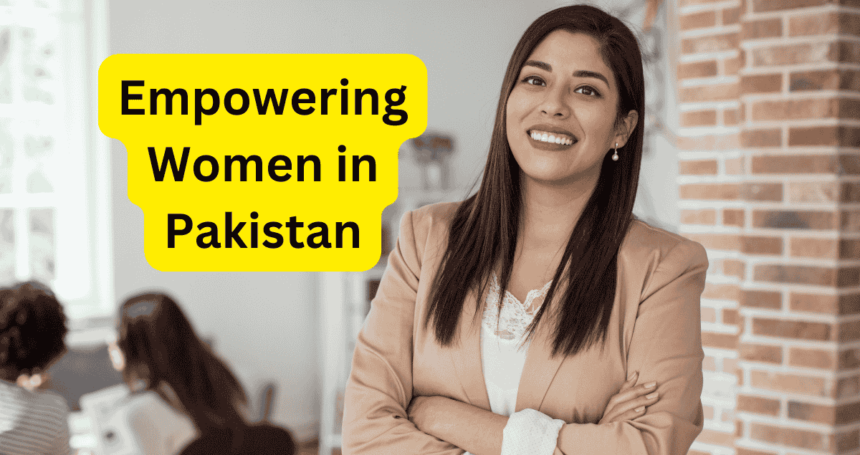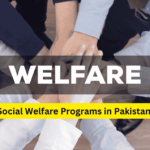In Pakistan, women make up a big part of the population. It’s crucial to support women empowerment programs. The Benazir Income Support Programme (BISP) is a key example. It gives financial help to millions, boosting their income by 20%.
Efforts for gender equality in Pakistan are growing. More women are voting, from 40% in 2011 to 70% in 2016. This shows the success of women empowerment programs. Programs like Waseela-e-Taleem have helped over 1.3 million students, with 49% being girls.
The Current Landscape of Women’s Rights in Pakistan
Pakistan ranks 153 out of 156 countries in the Gender Gap Index. This shows a big gap in gender equality. Women face many barriers, like not having access to education and jobs. Workshops and programs for women’s empowerment are key to solving these problems.
Projects like the Benazir Income Support Programme (BISP) try to help women financially and socially. Yet, about 70% of women in Pakistan still face domestic violence. Only 24% of women have jobs.
Statistical Overview of Gender Equality
- Gender Gap Index ranking: 153 out of 156 countries
- Domestic violence: 70% of women experience it
- Formal employment: only 24% of women have access
- Women’s literacy rate: around 48%
Key Challenges Facing Pakistani Women
Pakistani women struggle with many issues. They often lack access to education, healthcare, and jobs. Maternal deaths and child marriages are big problems. Women make up only 30% of the workforce, compared to 82% of men.
Recent Policy Developments
New policies aim to help women and fight gender-based violence. But, making these policies work is a big challenge. Workshops and programs for women’s empowerment are essential in improving their rights and status in Pakistan.
Women Empowerment Programs Pakistan: A Comprehensive Overview
Women’s advocacy programs and gender inclusivity campaigns are key in Pakistan. They help promote women’s rights and empowerment. Organizations like Bedari are working hard to make society more inclusive and fair through education and economic support.
Women empowerment organizations in Pakistan are making a big difference. They work to ensure women have equal access to education, jobs, and healthcare. Some of their main efforts include:
- Education and skills development programs to enhance women’s employability
- Economic empowerment initiatives to support women’s entrepreneurship and financial independence
- Healthcare and wellness programs to improve women’s physical and mental health
- Gender inclusivity campaigns to promote women’s rights and challenge societal norms
These efforts help build a more inclusive and fair society. Women get equal chances to participate and contribute. By supporting these programs, we empower women and help Pakistan develop sustainably.
| Organization | Initiative | Objective |
|---|---|---|
| Bedari | Education and skills development | Enhance women’s employability |
| Benazir Income Support Programme (BISP) | Economic empowerment | Support women’s entrepreneurship and financial independence |
| National Rural Support Programme (NRSP) | Healthcare and wellness | Improve women’s physical and mental health |
Revolutionary Economic Initiatives for Women
Women empowerment programs in Pakistan have boosted economic growth. The government has started programs like Waseela-e-Haq. It gives women microfinance and entrepreneurship chances. This is part of the Benazir Income Support Program (BISP), aiming to empower women and better their socio-economic status.
About 44 percent of Pakistan’s people live on low incomes. To help, women’s rights initiatives offer economic chances. For example, Waseela-e-Haq has helped women get microfinance and start businesses. For more info, check programs.pk about government and non-government programs.
Microfinance Programs
Microfinance programs help women economically. They offer loans and savings accounts for starting businesses. Efforts for gender equality ensure women get equal access to these services.
Skills Development Workshops
Workshops on skills development help women economically. They teach women to start businesses or find jobs. Women empowerment programs in Pakistan have given women the skills to compete in the job market.
Entrepreneurship Support Systems
Systems for supporting entrepreneurship have been set up for women. They include mentorship, business incubators, and finance access. Women’s rights initiatives and gender equality efforts help women start businesses. They ensure women have equal access to resources.
| Initiative | Objective | Impact |
|---|---|---|
| Waseela-e-Haq program | Provide women with access to microfinance and entrepreneurship opportunities | Empower women and improve their socio-economic status |
| Microfinance programs | Provide women with access to financial services | Promote women’s economic empowerment |
| Skills development workshops | Provide women with training and skills to start their own businesses or seek employment | Equip women with the skills and knowledge necessary to compete in the job market |
Educational Transformation Through Gender-Focused Programs
Educational change is key for women’s empowerment in Pakistan. Workshops and programs focus on women’s leadership are vital. They help make education more accessible and fair for everyone. Projects like Bedari’s aim to educate girls, closing the gap between boys and girls in school.
Some important stats show why education needs to change:
- About 22.5 million kids in Pakistan don’t go to school, mostly girls.
- More girls, 32%, than boys, 21%, miss out on primary school.
- By ninth grade, only 13% of young women are still in school.
Programs like Kashf School Sarmaya and Jazz Smart School are making a big difference. They boost education and digital skills for girls. Supporting these efforts helps create a fairer education system. This leads to a better future for girls in Pakistan.
Digital Literacy and Technology Access Initiatives
Digital literacy and technology access are key to empowering women in Pakistan. Women’s advocacy and gender inclusivity campaigns have helped a lot. The Benazir Income Support Programme’s Waseela-e-Taleem is a great example. It aims to boost education through digital means.
Women empowerment groups in Pakistan are also making a difference. For example, the ICT for Girls Programme trains 10,000 girls each year. It gives them tech skills and digital literacy, helping them access education and jobs.
Mobile Learning Platforms
Mobile learning platforms are helping women in Pakistan get more education. They let women learn new skills and get educational resources online.
Tech Skills Training Programs
Tech skills training programs are also important. They teach women the skills needed for better jobs and starting businesses.
| Initiative | Objective | Impact |
|---|---|---|
| Waseela-e-Taleem | Increase access to education through digital literacy and technology | Enabled thousands of women to access education and economic opportunities |
| ICT for Girls Programme | Train 10,000 girls annually from underprivileged backgrounds | Provided girls with tech skills and digital literacy, enabling them to access better job opportunities |
Healthcare and Wellness Programs Empowering Pakistani Women
Healthcare is key in women empowerment programs in Pakistan. It affects women’s well-being and work. Women’s rights push for affordable healthcare, mainly in rural areas. They also focus on women’s health, like maternal and reproductive care.
The Benazir Income Support Programme’s Waseela-e-Sehat is a great example. It gives women vital health services. This has helped women and children’s health, pushing towards women empowerment.
Some important stats show why healthcare is crucial in Pakistan:
- Maternal mortality rate: 140 deaths per 100,000 live births
- Infant mortality rate: 86 per 1,000 live births
- Total fertility rate: 5 children per woman
| Health Indicator | Pakistan | Global Average |
|---|---|---|
| Maternal Mortality Rate | 140 per 100,000 live births | 211 per 100,000 live births |
| Infant Mortality Rate | 86 per 1,000 live births | 30 per 1,000 live births |
| Total Fertility Rate | 5 children per woman | 2.5 children per woman |
Improving women’s healthcare is vital for gender equality in Pakistan. It leads to a healthier, more productive society.
Rural Women Empowerment Success Stories
Rural women in Pakistan are making big strides in empowerment. Thanks to many initiatives and programs, they are gaining ground. Organizations like Bedari are helping through programs in agriculture and community leadership. These empowerment projects for women have brought about great success, like more economic chances and better lives.
Naseem Mai saved about PKR 138,000 from selling vegetables in the Rabi season. Busmeela Bibi turned her vegetable sales into a global business. These stories show how women leadership development programs and female empowerment workshops are changing lives in rural areas.
The table below shows some important facts about empowering rural women in Pakistan:
| Program | Beneficiaries | Impact |
|---|---|---|
| Nestlé-BISP Rural Women Sales Program | Over 1800 women | Improved financial access and economic opportunities |
| FAO’s Livelihood and Food Security Improvement Fund | Women and youth in Khyber Pakhtunkhwa | Enhanced agricultural and livestock practices |
These efforts show how empowerment projects for women in rural Pakistan are working. They also show the need for more support and investment in women leadership development programs and female empowerment workshops.
Corporate Sector’s Role in Women’s Professional Development
Women’s advocacy programs and gender inclusivity campaigns are key in Pakistan. The corporate sector is crucial in this effort. They offer mentorship and leadership training. The Pakistan Demographic and Health Survey shows that employed women influence family decisions.
Organizations like the Women Entrepreneurship Development System (WEDS) help women entrepreneurs. They provide a platform for showcasing products and getting training. The corporate sector can help by offering resources and funding. For instance, youth employment programs in Pakistan have been successful in empowering women.
Here are some ways the corporate sector can support women’s professional growth:
- Provide mentorship and leadership training
- Support women’s advocacy and gender inclusivity campaigns
- Partner with women empowerment organizations in Pakistan
- Offer resources and funding for women entrepreneurs
By doing these things, the corporate sector can help make workplaces more inclusive. This promotes women’s empowerment in Pakistan.
| Initiative | Description |
|---|---|
| Mentorship Programs | Pairing women with experienced mentors to provide guidance and support |
| Leadership Training | Providing training and development opportunities to help women advance in their careers |
| Partnerships with Women Empowerment Organizations | Collaborating with organizations that support women’s empowerment and development |
Shaping Tomorrow: The Future of Women’s Empowerment in Pakistan
The future of women’s empowerment in Pakistan looks bright. Government efforts, non-profit groups, and businesses are working together to make big changes. Young women’s literacy rates are key, but there’s a gap that needs to be closed.
Improving education for girls is crucial. This will help create a fairer society. It’s important to focus on primary, middle, and high school enrollment for girls.
There are also big challenges like high dropout rates, poverty, and limited access to healthcare. By teaching digital skills, supporting entrepreneurship, and offering vocational training, Pakistan can help young women reach their full potential. Businesses will play a big role in helping women advance in their careers.
The journey to gender equality in Pakistan is ongoing. It’s important to tackle issues like violence, decision-making power, and control over earnings. With strong support for women empowerment programs and new policies, Pakistan can empower its women for a brighter future.
FAQ
What is the importance of women’s empowerment in Pakistan’s development?
Women’s empowerment is key for Pakistan’s growth. It fights for gender equality and opens doors to education and jobs. This boosts the country’s overall health and happiness.
What is the current state of women’s rights in Pakistan?
In Pakistan, women’s rights face many challenges. There are big gaps in gender equality and many obstacles for women. But, new policies aim to improve women’s status.
What are the various women empowerment programs available in Pakistan?
Pakistan offers many women empowerment programs. These include government efforts and non-profit groups like the Bedari Foundation. They aim to make society fairer and more inclusive.
What revolutionary economic initiatives are empowering women in Pakistan?
Women in Pakistan are getting economic boosts through microfinance, skills training, and business support. These programs give them financial power.
How are gender-focused educational programs transforming women’s lives in Pakistan?
Education is changing women’s lives in Pakistan. Programs like Bedari’s Girls’ Post Primary Education project aim for fair education. They see education as vital for women’s empowerment.
What digital literacy and technology access initiatives are empowering women in Pakistan?
Women in Pakistan are gaining through digital learning, tech skills, and online business. These programs offer education and job chances through technology.
How are healthcare and wellness programs empowering Pakistani women?
Healthcare programs like the Benazir Income Support Programme’s Waseela-e-Sehat are making healthcare fairer. They see healthcare as key to women’s empowerment.
What are the success stories of rural women empowerment in Pakistan?
Rural women in Pakistan are thriving. Programs in agriculture, community leadership, and business are giving them economic chances. They are becoming more independent.
How is the corporate sector contributing to women’s professional development in Pakistan?
The corporate world is helping women in Pakistan. Through mentorship and leadership training, they are creating fair workplaces. This supports women’s growth and empowerment.


